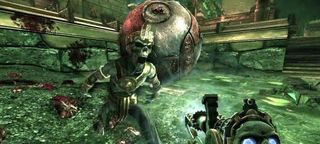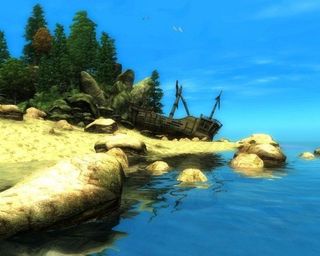Action-Adventure Game of the Year
The Ball

A masterstroke of minimalism, The Ball was the best gaming vignette of the year. There's no dialog, sweeping cinematics or tacked-on multiplayer mode to burden The Ball—just a lightweight, focused, gameplay-driven short story. It benefited from this simplicity by giving us a campaign that felt paced and personal. As you kick the multiton marble around with your ancient Mexican gravity gun, it somehow makes the transition from object to character. You develop this subtle but strong relationship with the object—it doesn't change or communicate, but it takes on the feeling of a pet following you through lava-soaked corridors.
Mod of the Year
Nehrim: At Fate's Edge

It's a total conversion for a four-year-old game (The Elder Scrolls IV: Oblivion), but Nehrim is so impressive that it was a contender not just for best mod, but for best RPG. Nehrim is massive, witty, occasionally vicious, incredibly ambitious and tremendously successful at injecting new life into a game that many of us have already played so much that we could scarcely imagine seeing anything new come out of it. Its world is wonderfully resolved—settlements look sensibly planned, residents have purposeful vocations, forests are dense and geography looks natural.
The dedication shown by the modders who took Nehrim from concept to realization is astonishing. Only on the PC do gamers have such power to shape their experiences.
Innovator of the Year
Minecraft

An unfinished, hyper-simple, low-fi independent game captured the imaginations of PC gamers more than anything else in 2010. But it isn't technical excellence that makes Minecraft the PC's brightest innovator (although there's plenty of that). Rather, it's the way that it reveres players' ideas. Minecraft doesn't provide any goal, story or explicit reward for digging in the earth. Instead, it allows players to cultivate their own experiences out of the simple tasks of digging and building, punctuated by a few monsters every now and then. Players approach the blank canvas in different ways: erecting world-spanning railroads or waterfall wonders; strip-mining the ground for rare ores; exploring dungeons; creating multiplayer metropolises or hidden fortresses; using in-game tools for bizarre science—making each player's experience necessarily unique.
PC Gamer Newsletter
Sign up to get the best content of the week, and great gaming deals, as picked by the editors.
Minecraft also demonstrates that word-of-mouth on the PC is still the surest route to indie success. Minecraft sold more than 700,000 copies in 2010 by way of players sharing their creations and discoveries on YouTube, Reddit.com and forums. This remarkable popularity is only possible on an open platform like the PC, where Minecraft creator “Notch” can deploy weekly updates to the game and collaborate directly with fans on content and bug fixes.
While we wouldn't expect Minecraft's financial success to become commonplace, it opens up a new business model for self-employed developers: selling before official release in order to finance development.
Hey folks, beloved mascot Coconut Monkey here representing the collective PC Gamer editorial team, who worked together to write this article! PC Gamer is the global authority on PC games—starting in 1993 with the magazine, and then in 2010 with this website you're currently reading. We have writers across the US, UK and Australia, who you can read about here.
Most Popular







